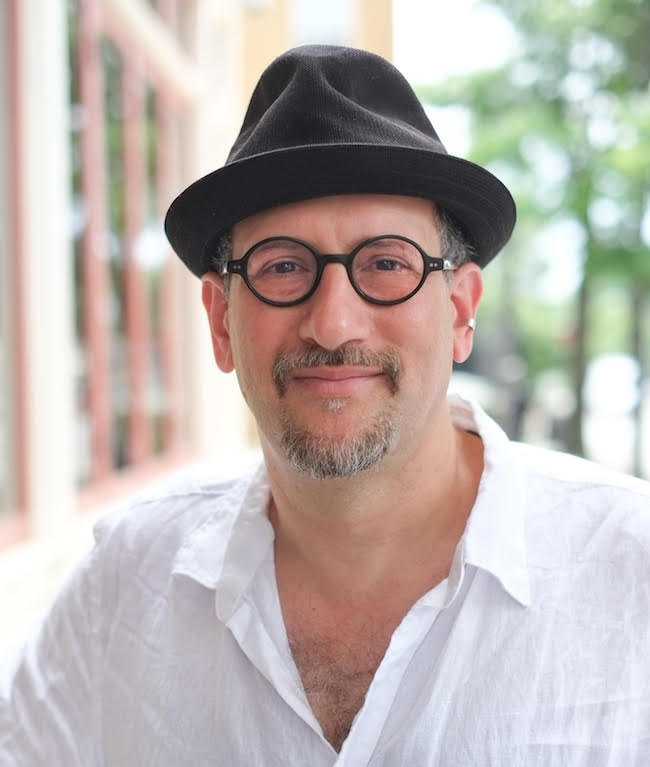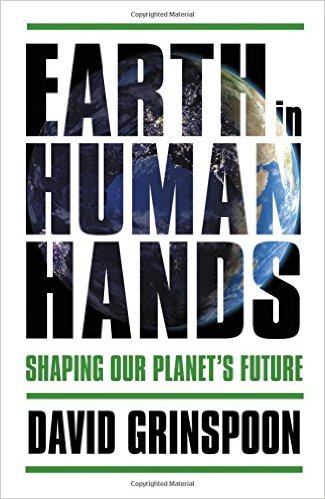
David Grinspoon is a comparative planetologist and an astrobiologist. He’s also a big book nerd, and his love for both fiction and nonfiction are proudly on display in his own new book, Earth In Human Hands: Shaping Our Planet’s Future.
Grinspoon’s book uses insight from the study of the other planets in our solar system and the search for extraterrestrial life—along with a healthy dollop of science fiction—to contextualize our current moment on Earth. According to Grinspoon, we are at a crossroads. Humans have become a planetary force, reshaping Earth’s ecosystems, biogeochemical cycles, climate, and more. But so far we’ve done so largely by accident, and often to the detriment of other species. Now is the moment to “human up” and start managing the planet intentionally, in order to protect its millions of species and our own health and happiness. If we prove to be equal to the task, human intervention could someday save more species than we’ve ever driven extinct by stabilizing the climate over the long term and fending off any large space rocks that might otherwise send us all the way of the dinosaurs. The result would be a transition to an intelligent planet, what Grinspoon calls Terra Sapiens.
I was interested to note that the book used a lot of examples from sci-fi, and could tell I was reading the words of a true fan. I’ve been meaning to explore this sprawling genre myself, something I didn’t do when younger out of a misplaced snobbery. I was an English major, after all. I was supposed to enjoy the slog through Henry James’ The Ambassadors rather than anything with, like, lasers in it.
But as Grinspoon and I discussed over Skype and beers, the geeks have won and sci-fi is officially cool—or maybe it has always been cool; I just didn’t know it. So I decided to get some tips on what I should read as I frantically catch up with the rest of the world. Here’s a edited version of our conversation.
Marris: So did you reread any science fiction while you were writing your latest book?
Grinspoon: I did. In the book, I develop this metaphor of the Earth as a generation ship. So I reread Orphans of the Sky by Robert Heinlein and Nonstop by Brian Aldiss. A generation ship is a solution for how you get to the stars, even though they are so far away you can’t get to them within a human lifetime—unless you invent some wacky new physics with wormholes or warp drives or something. So you make a ship big and comfortable enough so that a few generations can live out their lives on board. It is not just a metal box with compartments. It is some semblance of a world.
The idea of the Earth as a spaceship goes back to Buckminster Fuller and before him to Barbara Ward. Our world is in a certain kind of way a construct. And we have to learn how to drive this thing. But I emphasize the notion of a multigenerational ship. We’ve been handed this situation by our predecessors; we have to deal with it and had it off to the next generation in a responsible way. Nonstop is really the better book, but Heinlein was the original.
Marris: Okay, what else should I be reading?
Grinspoon: A book that was important to me in my life and that I mention several times in Earth in Human Hands was 2001: A Space Odyssey by Arthur C. Clarke.
 Marris: A book about advanced extraterrestrial life. What does that have to do with our environmental problems again?
Marris: A book about advanced extraterrestrial life. What does that have to do with our environmental problems again?
Grinspoon: Part of what I am trying to do in my book is abstract the question of what is going on here beyond the particulars of our particular moment on this particular planet. Is this a kind of phenomena that can happen to planets? Could this transition to an intelligently controlled planet have happened before? And when we ask that, we encounter this huge literature about the search for extraterrestrial intelligence (SETI) that has been in existence since the 1960s, and one of the big questions in that literature is the question of longevity of civilizations.
Marris: Because if civilizations tend to advance to a certain level of science and technology and then in short order destroy themselves through nuclear war or environmental destruction, then statistically they should be harder to find, right? Because they are surprisingly hard to find given how many stars there are. Isn’t that the Fermi Paradox? That there should be tons of aliens but we never hear from them?
Grinspoon: Yes, but back when SETI started there was this assumption that as technologies advanced they would always use more and more energy. Now younger astrobiologists are talking about the sustainability solution to the Fermi paradox. Maybe all those super advanced civilizations aren’t obvious because they have learned that there is no future in relentless expansion. This idea could be a mirror for our own future.
Another solution to the paradox came right out of science fiction. What if extraterrestrial civilizations are actually dangerous? Maybe that is why it seems like nobody is out there— because they are all being careful. What if there was a very advanced civilization that is sort of paranoid that goes around destroying young civilizations when they come on the interstellar broadcast because they might be a threat in the future? That idea comes out of a story by Fred Saberhagen and he’s got this whole series on it.
Marris: Okay, a lot of the books you are talking about are old and super optimistic about progress and stuff…
Grinspoon: That’s called Golden Age sci-fi.
Marris: Oh. But now isn’t darker, dystopian stuff really popular? Why is that?
Grinspoon: I enjoy a good post-apocalyptic story. I like A Canticle for Leibowiz by George Miller. It is really imaginative. I also love Earth Abides by George Stewart. It was written in 1949 but a lot of it feels totally current. He was a geographer and he did a great job imagining what would happen to animal and plant populations in the absence of humans.
Why dystopia? People are afraid of the future. They are being told that we might not survive. Like all good sci-fi, it allows us to explore what it means to be human by putting ourselves in a different world. But I worry a little bit about an over-proliferation of visions of doom.
Marris: Well, you are more of an optimist. You don’t think we are going off a cliff environmentally.
Grinspoon: The cliff is the wrong metaphor. It is a trajectory. It is a question of how much damage we are cause on the way. One hundred years from now we will be completely off fossil fuels. We will have a different set of systems for energy production. Looking back we will shake our heads; it will be like us looking back at the whale oil economy. Getting from here to there will have some damage. But it is inevitable that it is going to come.
Marris: Who else is on your must-read list?
Grinspoon: Stanislaw Lem, a polymath and really brilliant. Ursula Le Guin. She is fantastic. She doesn’t ignore space or the physics aspects of science fiction But she is brilliant at imagining slightly different variations of the human race. One writer I would really suggest is Kim Stanley Robinson. His most famous trilogy is about terraforming Mars. There are a lot of implications in his work for how we go about dealing with taking control of the planet. He’s got a brand new one out.
Marris: What are you reading at this particular political moment?
Grinspoon: I recommend Octavia Butler for recent compelling—but dark—future fiction. She writes beautifully with an eye toward intersectional cultural issues and how hope is maintained in the darkest of times. Read the Parable of the Sower and the Parable of the Talents.
Marris: Okay. I’ve got my homework. Now how did this happen? How did sci-fi become so cool?
Grinspoon: Maybe it is as simple as the fact that people like Bill Gates and Steve Jobs who were my type in high school made something in their garages that made them billionaires. Or maybe it is that we have accepted the notion that technology is going to determine our future. It will either save us or destroy us. Maybe that is why dystopian fiction is so popular and why being a geek has become cool. But maybe that’s a bit of an illusion because maybe ultimately it is our social abilities to get along with each other that are going to determine our future. Although obviously technology can help or hinder that. I mean, the conversation we are having right now is pretty high tech.
Marris: Yeah, the video phone kind of snuck up on us, didn’t it?
Fantastic work!, The life extraterrestrial exist!